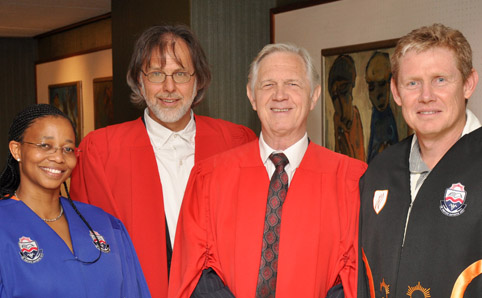Latest News Archive
Please select Category, Year, and then Month to display items
04 April 2024
|
Story Lunga Luthuli
|
Photo SUPPLIED
 Dr Juliet Kamwendo champions gender-inclusive climate action in Africa. Her expertise at the recently held AFR100 workshop highlighted vital steps towards sustainable and equitable development.
Dr Juliet Kamwendo champions gender-inclusive climate action in Africa. Her expertise at the recently held AFR100 workshop highlighted vital steps towards sustainable and equitable development.
Dr Juliet Kamwendo, Lecturer and Programme Director for Gender Studies in the Centre for Gender and Africa Studies at the University of the Free State, is spearheading efforts to integrate gender considerations into Africa's climate restoration agenda. Reflecting on her involvement, Dr Kamwendo stated, "This is particularly crucial, as women make up almost 50% of the population in Africa, and the depletion and degradation of land affect them disproportionately."
She recently served as a gender expert at the AUDA-NEPAD AFR100 workshop in Ouagadougou, Burkina Faso, from 25 to 29 March 2024. This initiative aims to restore forests and degraded land across Africa by 2030, with a focus on gender equality.
The workshop emphasised the integration of gender perspectives into the AFR100 project, acknowledging the disproportionate impact of land degradation on women. Dr Kamwendo's expertise highlighted the need to empower women in climate change interventions, addressing existing gender inequalities exacerbated by environmental degradation.
“Women – who are primarily responsible for household food security and water provision – bear the brunt of environmental degradation, leading to increased workloads, reduced income opportunities, and heightened vulnerability to climate-related disasters. Furthermore, the loss of forest cover and biodiversity further exacerbates the challenges faced by women, particularly in rural areas where they depend heavily on natural resources for their livelihoods,” added Dr Kamwendo.
Her participation highlights academia's crucial role in fostering inclusive and sustainable development, emphasising interdisciplinary collaboration to tackle complex environmental challenges. Through initiatives such as AFR100, stakeholders are working towards a more resilient and gender-responsive future for Africa.
Professor suggests San place-name book
2011-09-28
|

|
At the inaugural lecture of Prof. Raper were, from left to right: Dr Choice Makhetha, Vice-Rector: External Relations (actg); Prof. Theo du Plessis, head of our Department of Language Management and Language Practice; Prof. Raper; and Prof. Lucius Botes, Dean of our Faculty of Humanities.
Photo: Stephen Collett
|
Prof. Peter Raper, Honorary Professor: Linguistics, in the Department of Language Management and Language Practice at our university, delivered his inaugural lecture on Tuesday, 27 September 2011. Prof. Raper focused on the topic of “Interpretations and translations of Bushman (San) place names” and he recommended the establishment of a chair for Khoikhoi and Bushman name studies at the UFS. Prof. Raper said that, until about 2 000 years ago, the Bushmen and their ancestors were the only inhabitants of southern Africa and that, presumably, all place names in the region were of Bushman origin. Prof. Raper also suggested the publication of a dictionary of Bushman place names which will contribute to restoring and preserving Bushman toponymic, linguistic and cultural heritage.
In his inaugural lecture, Prof. Raper distinguished between the terms Bushman and San. He said “the term Bushman was for a long time considered an insult and San was preferred. Recently, Bushman became preferable and San is considered an insult”.